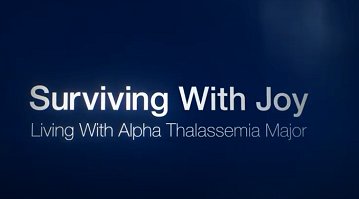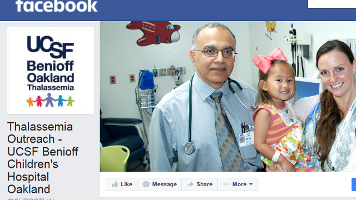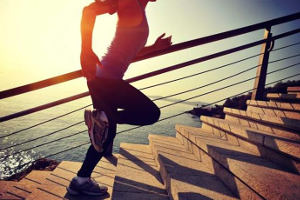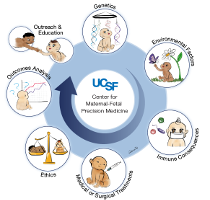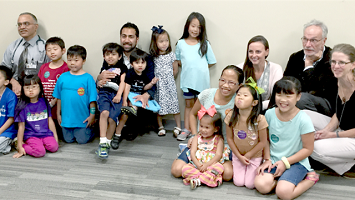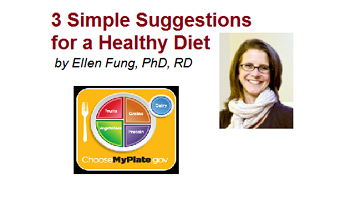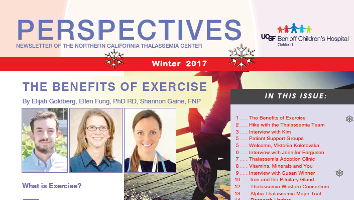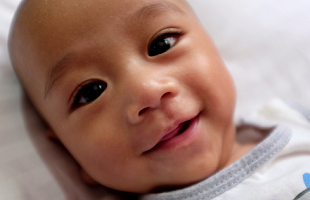Patient Stories
Family Ties
by Abby Torkelson
Being a thal (thalassemia) patient is one of the loneliest and greatest experiences in the world. “What do you like most about having thalassemia?” This was the stimulating question that was asked of us at the thalassemia retreat this past November. As one of two thalassemia major patients living in Alaska, thousands of miles away from any other thalassemia patients--a state that the U.S. postal service treats as a different country, in which people are surprised to discover that we do not live in igloos or have to dog mush to a first-aid station to be transfused bear's blood--I feel rather alone. Staying alive is a challenge and dying is to become a statistic. At least, it felt that way for most of my life.
One day, I met Children's Oakland's very own Thalassemia Outreach Coordinator, Laurice Levine, and my life has never been the same. Sunlight broke through the clouds and warmed me to the core; it shed its light on the narrow path I walked alone. Suddenly, I have found myself belonging to a family with invisible ties that I had only to meet.
The thalassemia retreat, organized by Laurice, was truly a retreat, a haven, and a place of safety from frustrations and fears. Although I met many people for the first time at this retreat, the weekend mirrored a family reunion. Conversations could instantly drop to a deeper level; bonds were made and strengthened as though each side had been waiting to adhere to just the right piece.
From carpooling, playing games, and talking, to making meals and doing chores together, the experience was amazing. The thought of waking up that first morning and wandering around to see what others were doing still brings a smile to my face. There was a cluster of people in the kitchen making breakfast and a table with food and more people. Another group of people was checking their blood sugar while others were eating. I belonged to the group that couldn't dig in until the little white tablets of the oral chelator Exjade had dissolved all the way in the gritty, milky white water and the water was drunk-the only thing allowed in my stomach for 30 minutes before I could put anything else down there to keep it company. But almost all the little groups had to swallow pills to begin the day.
Besides the wonderful opportunities to ask individuals questions such as, “How often do you get blood?” and “Does Exjade make you constipated?” we also had a group session where Huythong Nguyen and Laurice lead us in therapeutic discussions as only they could do. Only those who have stabbed themselves thousands of times with needles, swallowed enough horse pills to kill a horse, and watched their life trickle away in medical waiting rooms have the authority of speech and credentials to say, “I know it is hard but you really need to be compliant.” However, the most interesting question posed was, “What do you like most about having thalassemia?”
What do I like most about thalassemia? It is all the amazing people I have met and the fact that I am invisibly linked to them like family. I am not implying that this “family” is perfect, but it seems very much like a family to me. Many families have inside jokes and a family lingo-such as “getting poked,” “Exjade,” “L1,” “squid,” and “HMOs”. I think this is why even though I have only known Laurice since this summer, when she did outreach activities with my sister and me while we participated in the EDICT study, it feels as though I have known her my whole life. What do I like about thal? I like that the uncertainties in life have made so many of us stronger. It pushes us to live life to the fullest. It pulls us together as family. It gives us the opportunity to encourage others.
Cooley’s Anemia: Uncommon Threads
by Abby Torkelson
Whether you are meeting a new thalassemia (Cooley’s Anemia) patient for the first time or picking up where you left off with one from last year, there is an instant deep connection that ties us to each other. Some may see it as an affliction, but I am beginning to see it as a special mark that inspires us to strive to be extraordinary rather than to settle for mediocrity. In the tapestry of life, we have the honor of being woven with the same uncommon thread. We are unique and yet the same; our struggles and fears may be individual but are also so similar. You could say that it is in our genes.
This year’s thalassemia retreat was up in the beautiful wine country but there was no whine found among the patients. We spent our weekend together in the Russian River area, where Laurice Levine had arranged for us to stay at a beautiful and secluded estate. Our schedule consisted of settling in, exploring, cooking, cleaning, playing games, and catching up with one another as much as possible. On Saturday, we had our psychosocial session, moderated by Laurice. If I had to pick a title for it, I think I would call it “No Taboos.”
Imagine sitting in a group of 18 to 20 people, some of whom you have known for years and others whom you have just met for the first or second time. You can ask one question that every individual has to answer personally. The atmosphere is honest and truthful. What would your question be?
“I never expected to live past 30.” “They told my parents I would die in my teens.” “I just want to live into my 50s to see my child grow up.” “I’m living on borrowed time; I try to make the most of every moment.” “We need to live life to the fullest.” “It’s about quality, not quantity, of time.” These were just some of the comments that surfaced in answer to thought-provoking questions posed by various patients during the session. The questions included: “If you knew it was your last meal, what would you eat?” “For what would you want to be most remembered?” and “Where would you go if it was the last trip you would ever take?” Although death is not a popular subject in our society, it is a real part of a thalassemia patient’s life. I once heard someone say, “Thalassemia years are like dog years.” This is not to say that thalassemia patients live like dogs but that our lifespan is different, and each must decide to face it or try to flee from it.
We spent several hours posing questions and pondering answers, but interestingly, the theme remained constant. Although no one’s question included the words “death” or “dying,” somehow all the answers centered around that topic. To an outsider, the session might have seemed weird or depressing, but for us, it was very meaningful and needed. Only other thalassemia patients understand the struggle of getting up each day. No one else can imagine the fears or frustrations of having thalassemia. No one can empathize with the loss of a friend who had thalassemia like another patient who has lived your greatest struggles, experienced your deepest fears, and felt your biggest dreams.
For me, having thalassemia means that I have to make every moment count. It means that no time or person should be taken for granted and that I should try to live with no regrets. I believe that there are only a few things that will truly matter on my deathbed: those whom I love, those who love me, and where I’m going to spend eternity.
I would like to thank the ICF for sponsoring this event – without you we would not have these experiences – for this and more I thank you from the bottom of my heart.

